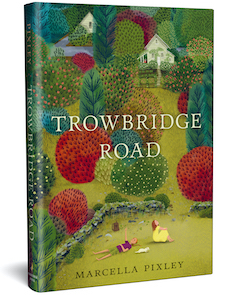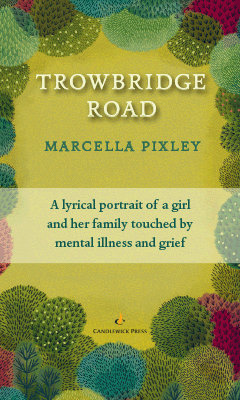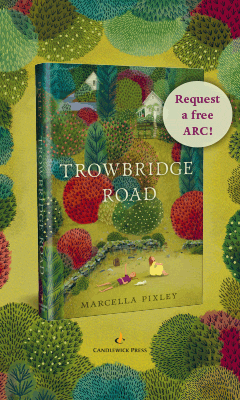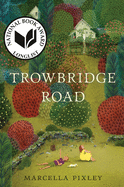Trowbridge Road
by Marcella Pixley
Marcella Pixley's latest middle-grade novel is at once a glorious celebration of the power of imagination and a heartrending cautionary tale about the danger of keeping certain secrets. Written with compassion, eloquence and a profound understanding of the ways physical and mental illness can rack a family, Trowbridge Road is positively luminous.
When 11-year-old June Bug Jordan meets Ziggy Karlo in the summer of 1983, they are two terribly lonely children with many "things [they] don't talk about." June Bug's father died last year from a not-yet-understood illness called AIDS, and her mother Angela's mental illness is spiraling out of control: Angela obsesses over the possibility of germs coming through the cracks in the walls or on the groceries June Bug's uncle drops off every week. An inveterate observer (and tree climber), June Bug gets out of her sterile house when she can and begins to secretly watch Ziggy and his mother and grandmother, Nana Jean, from a copper beech tree in their backyard. Ziggy is staying with Nana Jean while his mother, a victim of domestic abuse, struggles to regain control of her life. He has long red hair, purple T-shirts with unicorns and a white ferret named Matthew--and a history of being bullied. He looks to be on track to being picked on again, this time by kids on Trowbridge Road, although Nana Jean is a fiercer protector than his troubled, distracted mother. Once they meet, June Bug thinks she and Ziggy "fit just fine" together.
With their shared sense of magic, the friends find a touching connection. In marvelous scenes of mystical imagination, they conjure a dragon-filled "ninth dimension" from high up in the copper beech and deep within a cellar hole sanctuary they call Majestica. In the tree, June Bug tries to make leaves move with her mind. Telekinesis, Ziggy says, "is not unusual for nomads of the ninth dimension." He tells her, "I'm with you. Can you feel me? I'm bringing you up into the branches. I'm lifting you." Having mothers who love them but don't know how to "make it stick" means the children must find another heart that knows them. They find that heart in each other, and also in June Bug's uncle and Ziggy's grandmother. As their friendship grows, so does their strength. Still, the secrets they carry weigh heavily.
June Bug's home-bound mother would like her daughter to stay in every Saturday to disinfect the house, following rules that include "Germs from the walls can fall to the counters, can fall to the floor, can get trapped beneath your feet and then spread back into the rest of the house, so you always do the first floor last with a brand-new bucket of bleach." The ever-ready bleach is also used to clean what her mother calls the "disgustingness" off June Bug when she returns home with the smell of the outside world on her skin and in her mouth. But June Bug begins finding ways of resisting her mother's compulsive behavior. She secretly fills a backpack with "Necessaries" for scouring the outside world off her skin before coming home: carrot scraper, letter opener, mouthwash, Q-tips and, of course, a jar of bleach. Keeping the almost anthropomorphized Backpack close at hand, she feels safe playing in the trees, grass and mud with Ziggy. But even the Necessaries can't keep the real world from eventually entering June Bug's home.
When the three generations of Ziggy's family, plus June Bug, come together in an explosive scene one morning, June Bug receives an unexpected gift. She learns that "a mother and daughter could be angry at each other. They could be furious. They could even hate each other for minutes or even sometimes years. But then they could sit at the kitchen table together on a sunny morning and eat breakfast, and they could swallow the food and feel full." Living as she does inside a silent secret, June Bug is stunned at this revelation.
Trowbridge Road is the kind of all-absorbing book that, at the end, leaves a reader startled to discover that the real world has been going on outside its pages all the while. June Bug's first-person narrative keeps readers squarely behind the eyes of a bewildered, grieving, growing 11-year-old. She, along with every other central character, is multilayered, authentic and vividly depicted. As in Katherine Paterson's Bridge to Terabithia, the interplay between real and imagined worlds is seamless and as natural as the friendship between kindred souls. The scenes in the ninth dimension will have many readers longing to become nomads with June Bug and Ziggy, even as they suspect that one only travels in that world to escape this one. Those who know from personal experience "what happens to a home when it becomes a holding place for... secrets" will ache for the two young friends as they channel their pain and confusion in the best way they know how: through their imagination and connection with people who know how to make their love stick. --Emilie Coulter








